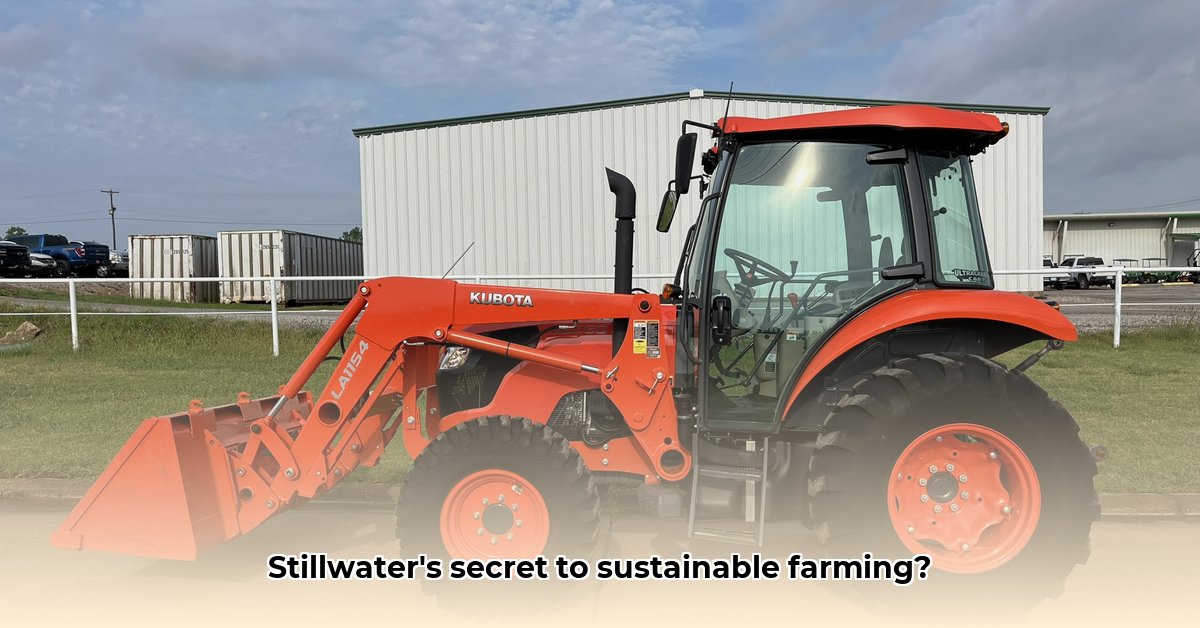
Great Plains Kubota: A Case Study in Sustainable Agriculture
Great Plains Kubota Stillwater (GPKS) serves as a pivotal example of how agricultural equipment dealerships are facilitating the transition to sustainable farming practices in the Stillwater, Oklahoma area. This article examines GPKS's role in providing farmers with the tools and support needed to adopt environmentally friendly methods, while exploring the challenges and opportunities inherent in this transition. For additional Kubota resources, check out this helpful site: Kubota Mirrors.
Sustainable Farming Equipment: Precision and Efficiency
GPKS likely offers a range of Kubota equipment designed for sustainable agriculture. This includes fuel-efficient tractors that reduce operating costs and minimize a farm's carbon footprint. Precision farming tools—GPS-guided systems and other technologies—allow for optimized planting, fertilization, and irrigation, minimizing waste and maximizing yields. Furthermore, the dealership probably carries equipment that promotes soil health, such as specialized tillage implements to minimize soil disturbance. Isn't it remarkable how technology can contribute to both profitability and environmental stewardship?
Supporting Local Farmers: A Holistic Approach
GPKS's commitment to sustainable agriculture extends beyond equipment sales. They likely provide comprehensive training programs, including hands-on workshops and demonstrations, to empower local farmers with the knowledge to effectively use their new technologies. Consultations help farmers tailor sustainable solutions to their unique needs and farm sizes. Financing options, potentially through partnerships with local lenders, make sustainable upgrades more accessible to farmers of all sizes. This multi-faceted support system is key to fostering widespread adoption of better practices.
Challenges and Opportunities: Navigating the Transition
The adoption of sustainable agriculture practices isn't without challenges. The high initial investment in new equipment can be a significant barrier for some farmers. However, GPKS's financing options and emphasis on showcasing the long-term financial benefits of sustainable practices (like reduced input costs and enhanced yields) can mitigate these concerns. Overcoming ingrained farming practices and addressing farmer skepticism requires ongoing education and support, yet the potential rewards—reduced environmental impact and improved economic resilience—are substantial. Government incentives and subsidies for sustainable farming equipment further facilitate this transition.
Case Studies: Illustrative Examples of Success
While specific data for individual Stillwater farmers is unavailable for this article, let's consider hypothetical examples to highlight the potential benefits. Farmer Jones, after investing in a fuel-efficient Kubota tractor from GPKS, experienced a 15% reduction in fuel costs. Farmer Smith, using precision planting technology, increased crop yields by 10% while simultaneously reducing fertilizer waste. These examples underscore the potential for significant economic and environmental gains achievable through the adoption of sustainable farming technologies and the support of a knowledgeable dealer.
Market Analysis and Future Outlook: A Growing Demand
The market for sustainable agricultural equipment in the Stillwater area is expanding. Growing consumer demand for sustainably produced food is a major driver, pushing farmers toward eco-friendly technologies. Government policies and incentives further amplify this trend. Additionally, ongoing technological advancements continually enhance the efficiency and affordability of sustainable solutions. This convergence suggests a robust future for the sustainable farm equipment market in Stillwater and surrounding areas. GPKS is well-positioned to prosper within this dynamic environment.
The Broader Impact: A Healthier Ecosystem
The ripple effects of GPKS's work extend beyond individual farms. Widespread adoption of fuel-efficient equipment and precision farming techniques lead to a collective decrease in fuel consumption, minimized fertilizer and pesticide use, and optimized water management across the Stillwater agricultural region. This translates to cleaner air and water, healthier soil, and a more resilient agricultural ecosystem. The positive influence on the entire community is undeniable.
Conclusion: A Collaborative Effort for Sustainability
Great Plains Kubota Stillwater actively contributes to a more sustainable agricultural future in the region. Their provision of advanced equipment, coupled with comprehensive training and support, empowers Stillwater farmers to adopt environmentally responsible practices. This collaboration creates a healthier ecosystem and a more sustainable and economically robust agricultural sector for the years to come.
Call to Action: Partner with GPKS for a Sustainable Future
Stillwater farmers seeking to enhance their sustainability and farm efficiency should contact Great Plains Kubota. They offer a comprehensive approach to sustainable agriculture, providing the tools, knowledge, and resources to achieve your goals. Their expertise is a vital asset in building a thriving and sustainable agricultural community.